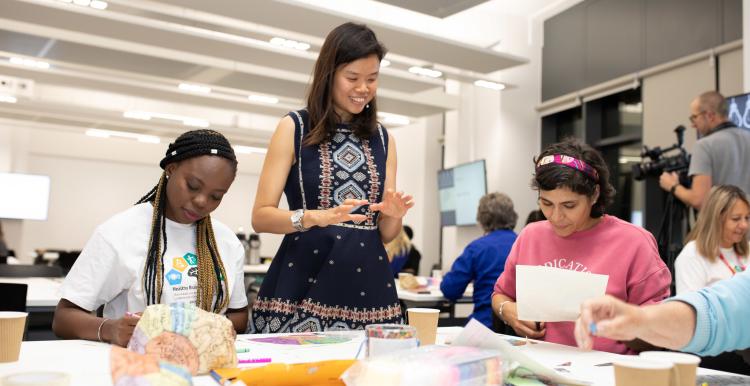Helping Healthwatch work together to speak to people in diverse communities

We know that Healthwatch are keen to explore different approaches to engaging with diverse communities. As well as providing case study examples of different ways you can do this, we’re always looking at how we can support you to learn from one another.
About the pilot
We offered a small grant to two local Healthwatch to run a series of facilitated sessions over 12 weeks with small groups of Healthwatch committed to working with a specific community.
We chose two communities that we hear little from for the pilot:
- Black African people
- Gypsy Roma and Travellers
The intention was to support the groups in learning from one another and identify approaches that work for their individual areas. During this time, they created action plans to speak to people in their chosen community and report on what worked well and what could be improved.
Healthwatch Lincolnshire and Healthwatch Central West London shared their reflections on the process:
What made you want to apply for the grant and be part of this pilot?
We thought this would be an excellent opportunity to network with colleagues from other local Healthwatch, share what worked well for us and help develop their knowledge and understanding.
Tell us more about your approach:
Working with small groups of local Healthwatch, we ran four sessions across twelve weeks. In these sessions, we used an approach called ‘facilitated peer learning’. Working together, we helped to identify challenges, opportunities and develop plans for each local Healthwatch on how they can speak to people in the specific communities.
This method allowed everyone in the group to contribute and support each other while also being supported themselves and coming away with a clear set of actions.
We met every three weeks to hold each other to account, monitor progress, share any issues we were having and provide suggestions on how to overcome them.
What did you learn about this way of working?
Some people were initially a little apprehensive about working differently and using the Theory of Change to approach a project. On the flip side, some had high expectations of what they could achieve in such a short time, so we had to find a bit of balance.
What worked well, and what challenges did you face through using this way of tackling a project?
This was a great way to work with people in the network who you wouldn’t normally get to meet. Both groups were a bit apprehensive at the start, but together we worked to create a supportive environment where everyone could share their assumptions, anxieties, experiences and build trust amongst the group.
People told us that they liked working together to discuss their challenges and have the chance to solve problems and give suggestions to others.
The pilot was a great starting point. It helped people allocate time outside of their usual day-to-day to go back to basics and create a plan.
This pilot only lasted three months, but for it to be meaningful, the work would need to continue in the long term, and it takes time to build trust and relationships with a community.
We all agreed that diverse communities should form part of your long-term engagement plan rather than a distinct ‘project’ and remember management buy in is key.
As always, technology can be an issue, so it’s really important to always have a plan B. Sometimes technology can fail you, so make sure you’ve got a backup just in case – simple things like having people’s phone numbers to contact them made a difference.
What impact did this way of working have?
Although it’s too early to say at the moment the direct impact of this work so far, we saw great examples of how through using this approach, local Healthwatch have started to build trust with key people within the communities they were trying to reach. These included a food larder at a Traveller site, a boating community, church groups and African and Caribbean societies at colleges and universities.
This process has helped build confidence in the network of developing and nurturing these relationships in the future.
Top tips on engaging with specific communities
Go back to basics
What techniques do you already use well for your engagement work and how could they be applied? What and who do you already know? Use this information as the building blocks to your engagement work.
Do your research
Find out what’s already happening in your local area and what services have developed relationships with the community. Take time to build relationships with those who already have a good standing in the community and learn from them.
Show the value of Healthwatch by providing useful information
Accessing a GP is a big issue for many people whose experiences aren’t often heard, so starting a conversation with immediately helpful information such as the GP access cards often helps to get things going. You can order GP access cards directly online for free.
Work backwards from where you want to be
The Theory of Change is a great way to help you work out what steps to take to succeed in what you want to do.
Take time to build trust
Focus on asking people what they want and what they need rather than pushing a Healthwatch agenda. Remember that for this to work best, the relationship needs to be long lasting.
